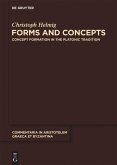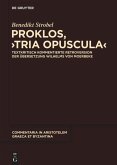This book is the first systematic study of Neo-Platonist philosopher Proclusâ?? theory of the bad. Examining Proclusâ?? overall system demonstrates that his critique of Plotinusâ?? attribution of all ill to the material is cogent. Moreover, a comparison between Proclus and Plato shows that the Proclusâ?? theory of the ethical bad can be plausibly construed as an interpretation of Platoâ??s theory of action. Finally, examining the similarities between Dionysius Areopagitaâ??s theory of the bad and Proclusâ?? preceding theory allows one to discern which elements of Dionysiusâ?? view are of his own creation and which are borrowed from his predecessors.
Diese Studie stellt die vom Neuplatoniker Proklos entworfene Theorie des Schlechten erstmals in ihrem systematischen Gesamtzusammenhang dar. Auf dieser Basis wird die Kritik des Proklos an Plotins Zurückführung des Schlechten auf die Materie der Sinnendinge neu untersucht; der Haupteinwand des Proklos, dass Plotins Theorie des Schlechten mit dessen monistischer Grundthese unvereinbar sei, erweist sich dabei als stichhaltig. Allerdings ist Proklos' eigene Zurückführung aller Übel auf eine unbestimmte Vielheit "uneigentlicher" Ursachen mit seinem strengen Monismus letztlich gleich inkompatibel.
In vorliegender Arbeit wird, anders als im Großteil der bisherigen Forschung, der Schwerpunkt auf das ethisch Schlechte gelegt, welches für Proklos das Schlechte par excellence oder gar das einzig eigentlich Schlechte (ont s kakon) ist. Ein Vergleich zwischen Proklos und Platon macht plausibel, dass die proklische Theorie des ethisch Schlechten eine Interpretation der Handlungstheorie Platons ist. Schließlich wird durch eine Gegenüberstellung der Theorie des Schlechten bei Dionysios Areopagites mit ihrer proklischen Vorlage erstmals genau zwischen entlehntem Gedankengut und eigener Leistung des Dionysios unterschieden.
Diese Studie stellt die vom Neuplatoniker Proklos entworfene Theorie des Schlechten erstmals in ihrem systematischen Gesamtzusammenhang dar. Auf dieser Basis wird die Kritik des Proklos an Plotins Zurückführung des Schlechten auf die Materie der Sinnendinge neu untersucht; der Haupteinwand des Proklos, dass Plotins Theorie des Schlechten mit dessen monistischer Grundthese unvereinbar sei, erweist sich dabei als stichhaltig. Allerdings ist Proklos' eigene Zurückführung aller Übel auf eine unbestimmte Vielheit "uneigentlicher" Ursachen mit seinem strengen Monismus letztlich gleich inkompatibel.
In vorliegender Arbeit wird, anders als im Großteil der bisherigen Forschung, der Schwerpunkt auf das ethisch Schlechte gelegt, welches für Proklos das Schlechte par excellence oder gar das einzig eigentlich Schlechte (ont s kakon) ist. Ein Vergleich zwischen Proklos und Platon macht plausibel, dass die proklische Theorie des ethisch Schlechten eine Interpretation der Handlungstheorie Platons ist. Schließlich wird durch eine Gegenüberstellung der Theorie des Schlechten bei Dionysios Areopagites mit ihrer proklischen Vorlage erstmals genau zwischen entlehntem Gedankengut und eigener Leistung des Dionysios unterschieden.








